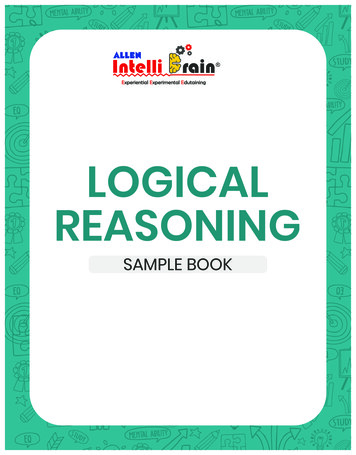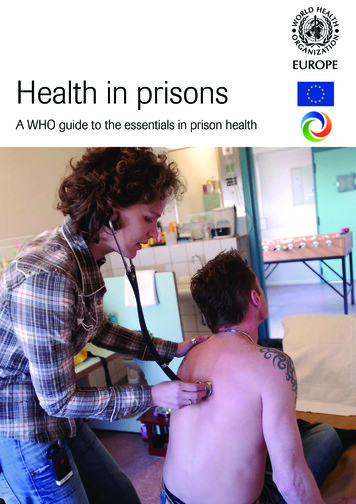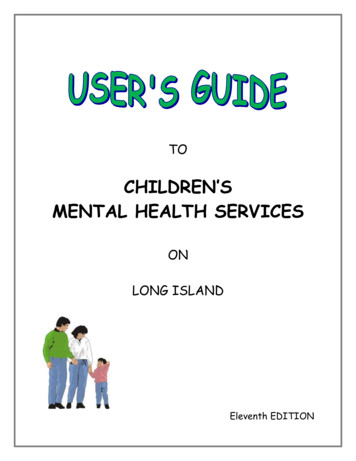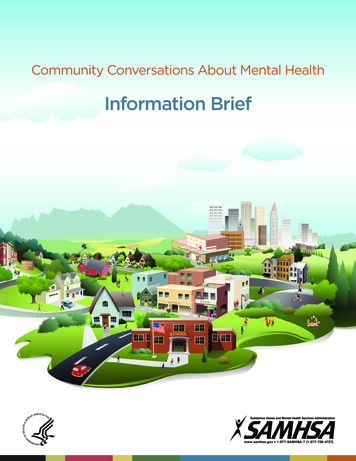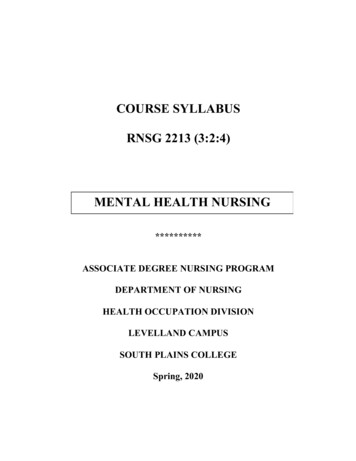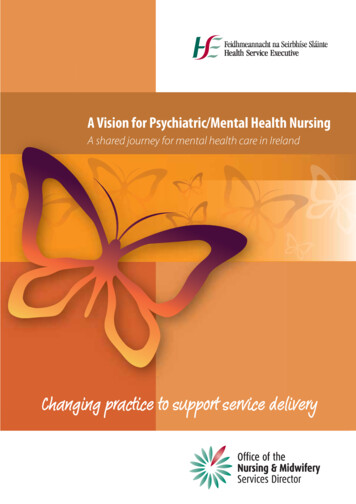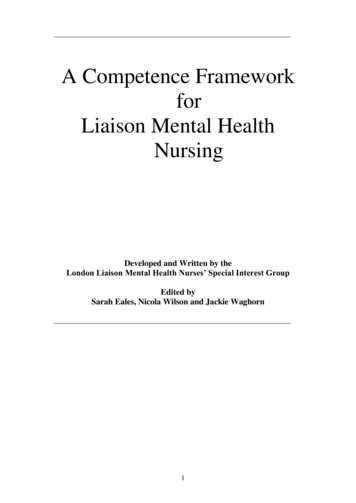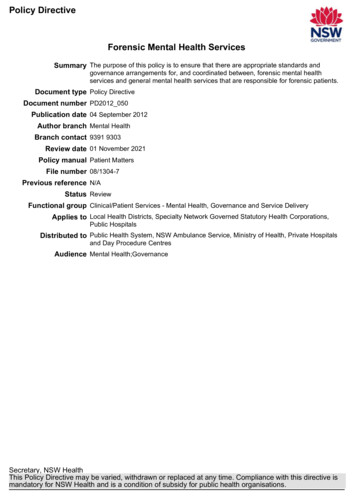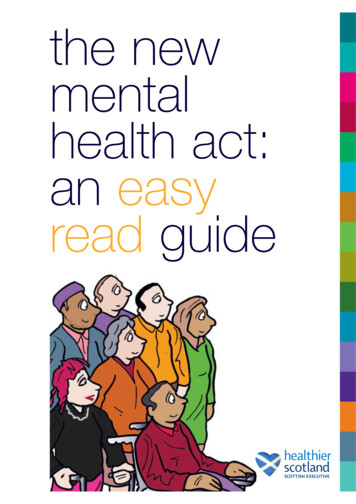
Transcription
the newmentalhealth act:an easyread guide
the newmentalhealth act:an easyread guideScottish Executive, Edinburgh 2007
We wish to thank the Scottish Consortium for Learning Disability for writing this easy read guide. Crown copyright 2007ISBN: 978-0-7559-5253-3Scottish ExecutiveSt Andrew’s HouseEdinburghEH1 3DGProduced for the Scottish Executive by RR Donnelley B48704 08/07Published by the Scottish Executive, August, 2007Further copies are available fromBlackwell’s Bookshop53 South BridgeEdinburghEH1 1YS100% of this document is printed on recycled paper and is 100% recyclable
The New Mental Health Act: An Easy Read GuideThe New Mental Health Act01What is ‘The Mental Health Act’ all about?102Advance statements5People03Named person1704Independent advocacy2505The rights of carers3106Mental health officer (MHO)39Organisations07The Mental Welfare Commission4708The Mental Health Tribunal5509Health Boards and local authorities65Special Powers10Consent to treatment7311Compulsory treatment orders8312Emergency and short-term powers9113People involved in criminal proceedings10314How do I appeal?125Other Information15Words used in this guide13516Where else can I get help or advice?137
What is the Mental Health Actall about?This is the new law which says how you can betreated if you have a mental disorder. It also sayswhat your rights are.Mental disorder are the words used in the law todescribe someone who has A mental illness A learning disability A personality disorderThat’s if a person has aMental Illness, a learningdisability or apersonality disorderThis talks abouthaving a ‘Mental Disorder’- what’s that?10101The New Mental Health Act: An Easy Read Guide
00The new law says: when you can be given treatment even if you do not want it when you can be taken into hospital even if you do not want to what your rights are how your rights are protected.What does the new law say about my rights?The people who give you care and treatment should listen to: your views about your care and treatment. what you said about your care and treatment in the past. what some other people think about your care and treatment. your carers named person (someone you can choose to look out for you ifyou have to have treatment. They help decide about your careand treatment) guardian (someone appointed by the court to make decisions foryou if you are unable to decide for yourself) Welfare Attorney (someone you choose to decide about your careand treatment if you become ill and cannot decide for yourself)2
The New Mental Health Act: An Easy Read GuideThese are our rights!!!!!!The people who give you care and treatment should tell you about: your care and treatment any choices you can make what they think will work best for you any help which you or your carer can get.They must make sure that: They know as much as possible about you and your life You are treated as well as possible If you have to be held for treatment it is for the shortest time needed You have care as long as you need it3
02Advance statements02 The New Mental Health Act: An Easy Read GuideWhat is an advance statement?What should I put in it?What does the witness do?Who can help me write it?When will it be used?Who should know about it?How can I change it?Doctors want toknow what youwant and whatworks for YOU!Yes, and I am wellenough just nowto say what I want5
What is an advance statement?If you are ill, it is important that the people who look after you knowabout: the treatment that works for you the treatment that does not work for you the treatment you do not want why some treatments are better for you than others.An advance statement lets you put these things in writing. You shouldwrite this when you are well enough to say what you want.The doctor willread this if youget ill6And the doctor willknow what I think
The New Mental Health Act: An Easy Read GuideWhat should I put in my advance statement?Your statement should have: your name and address the treatments you want the treatments you do not want the name and address of your witness the job of your witness the date your statement was witnessed.You should also include the name and address of: your named person your carer your GP your guardian and welfare attorney if you have one.[See the example form on pages 13 and 14.]Named person: someone you choose to look out for you if you haveto have treatment. They help to make decisions about your care andtreatment.Guardian: someone appointed by the court to make decisions for youif you are unable to decide for yourself.Welfare Attorney: someone you choose to decide about your careand treatment if you become ill and cannot decide for yourself.7
What does the witness do?A witness must check and sign your statement. The witness checksthat you understand what is in your statement. If they think that you do,they will ask you to sign it. They will also sign it.If you are sure youunderstand this wewill both sign here.Yes, I am happy Iunderstand this8
The New Mental Health Act: An Easy Read GuideWho can be a witness?A witness can be: a doctor a nurse a lawyer a social worker an occupational therapist a clinical psychologist a supervisor or manager of a care service.Who can help me write my advance statement?Another person can write your statement. They must write what yousay you want and need. They should not write what they think. Peoplewho could help. your family doctor or nurse mental health officer (a specially trained social worker who helpspeople who have a mental disorder) independent advocate (someone who helps you say what you thinkabout your treatment) Support worker.9
When another person has written your statement, the witness makessure that you agree with it. If they think that you do, they ask you tosign your statement. They also sign it.So you are happythis is what youwant to sayYes and thankyou for helpingme write itWho should know about my advance statement?You should give a copy to all those who are caring for you. Forexample: carer family named person10
The New Mental Health Act: An Easy Read Guide doctor nurse guardian welfare attorney independent advocate mental health officer solicitor.You need to keep a list of everyone who has a copy of your advancestatement. If you make any changes you need to tell all the people whohave a copy.When will my advance statement be used?If you become ill, you may be unable to decide about your treatment.People caring for you should read your advance statement and thinkabout your wishes. It helps them to decide what is best for you.Ayesha’s advance statement says she does not want MedicineXXXXX because it makes her feel ill. When the doctor reads thishe/she decides to give Ayesha another medication.Colin’s advance statement says he wants to be given MedicineXXX because he thinks it helps him. The doctor reads this butcannot give Colin this because he/she knows it would not be rightfor him at this time. The doctor explains why in writing and givesthis to Colin and all those caring for him.11
How can I change my advance statement? You can review your advance statementThis means you read it and decide if it is still OK for you. It is a goodidea to do this every 6 months or every 12 months. You shouldalso check the list of everyone who has a copy. You can withdraw your advance statementIf you do this, you should write the words:“I withdraw the advance statement made by me (write your name)on (write the date your statement was witnessed)”The witness checks that you no longer want your advancestatement. They sign and date this. [See the sample form onpages 15 and 16] You can change your advance statementYou need to write a new advance statement and withdraw the old one.If you do this, the witness checks and signs both of these.12
The New Mental Health Act: An Easy Read GuideAdvance statementMade UnderThe Mental Health (Care And Treatment) (Scotland) Act 2003Your Name:Your Address:If I (your name) am ill in the futureand not able to say what I think about my treatment I would like theseviews to be known.1. I would like to receive the following treatments:2. I would not like to receive the following treatments:13
3. Your Signature4. Your Witness should complete this partI certify that in my opinion[name of the person making the advance statement] is able to givehis/her wishes as they have done so.I hereby witness his/her signature.SignatureDate:Full name of witness:Address of witness:Job of witness:You should keep a list of the names of everyone who has a copyof this document.14
The New Mental Health Act: An Easy Read GuideWithdrawal of advance statementYour Name:Your Address:I [your name]wish to withdraw my advance statement. This was signed and datedon and it was witnessed by[name of your witness]Your Signature:15
Your Witness should complete this part2. Witness CertificateI certify that in my opinion[name of person withdrawing advance statement] is able to set downhis wishes as above. I hereby witness his/her signature.Your witness signs here:The date of signing:Full name of witness:Address of witness:Job of witness:You should keep a list of the names of everyone who has a copyof this document.16
03Named personWhat is a named person?What do they do?Who can I choose to be my named person?How do I nominate my named person?How can I change my named person?Who can be a witness?I can help decideabout your careand treatment03 The New Mental Health Act: An Easy Read GuideYes, you know mewell and I trust you17
What is a named person?If you need treatment under the new Mental Health Act you can choosesomeone to look out for you. This person is called a named person.Anyone aged 16 or over can choose a named person.Your named person can make important decisions about your care ifyou are not able to decide yourself. Because of this you should choosesomeone who knows you well and who you can trust.That’s right. I canhelp decide what isbest for you18So if I am ill thedoctor will askyou what you think?
The New Mental Health Act: An Easy Read GuideYou can have an independent advocate and a named person. Youradvocate cannot be your named person because they have differentjobs to do.Your independent advocate is someone who helps you say what youthink about your treatment.19
What does my named person do? They must be told about your care. Anyone who gives you care and treatment must ask your namedperson what they think. Your named person can ask the Mental Health Tribunal to decideabout your care. They can go to the Tribunal and give their views.The Tribunal decides about the compulsory treatment of people withmental disorder. They agree (or not agree) to medical examinations of you where theyare needed for a Compulsory Treatment Order. This means you havetreatment even if you do not want it. They can ask the Local Authority or Health Board to assess your needs.I will get copies of allyour records20It is good you canread everything
The New Mental Health Act: An Easy Read GuideWho can I choose to be my named person?Anyone aged 16 or over can be your named person. The person mustunderstand what is involved.I’m under 16,who’s MY NamedPerson?It will be one of us,your parent . . . or guardian . . . or LocalAuthority . . . or maincarerYour named person can be: Your carer Your partner Your nearest relative (mum, dad, brother or sister, or cousin) Another service user Anyone else you choose21
Your named person should not be anyone with responsibility for your carelike your GP or mental health officer.Mental health officer: a specially trained social worker who helpspeople who have a mental disorder. He/she should tell you about yourrights and make sure you get the care you need.How can I nominate my named person?Once someone agrees to be your named person you need to write downthat you chose them to be your named person. This is called a“nomination”.A nomination must be: Signed by you Signed and dated by a witnessThe witness must say that you understand about choosing a namedperson and that you have not been put under pressure by anyone.What if I do not choose a named person?If you are 16 or over and decide not to choose a named person your mainadult carer becomes your named person. If you don’t have an adult careror they don’t want to be your named person it will be your nearest relative.22
The New Mental Health Act: An Easy Read GuideHow can I change my named person?Gina is not happy with her named person, her cousin Rita. She makesa written statement saying she no longer wants Rita to be her namedperson. Gina signs the statement and asks her nurse to witness thestatement. She then chooses a new named person.Can I stop someone from being a named person?Sean does not want his brother to be his named person. He makes awritten statement saying he does not want this. He asks his socialworker to be his witness. They both sign and date the statement.Can anyone else change my named person?Yes. If some people think your named person is not suitable they can askthe Tribunal to change this. The people who can do this include yourmental health officer, your Responsible Medical Officer (this will usually bethe consultant who is in charge of your care) and your relatives.If you are not happy with a named person the Tribunal chooses for you,you can apply to the Tribunal to change this person.23
Who can be a witness?A witness can be: a doctor a nurse a lawyer a social worker an occupational therapist a clinical psychologist a supervisor or manager of a care service24
04The New Mental Health Act: An Easy Read GuideIndependent advocacy04 What does the law say?What is independent advocacy?Why might I need it?When might I need it?Who will help me get it?Where can I get more information?25
What does the law say?Under the new Act people with learning disabilities and people with amental illness have a right to independent advocacy. You do not haveto be in hospital to get this right.This means that you should be able to have an independent advocateand/or join an advocacy group if you want to.What is independent advocacy?Independent advocacy helps you to make your voice stronger and tohave as much control as possible over your life.26
The New Mental Health Act: An Easy Read GuideIt is called independent because advocates and advocacy workers areseparate from services. They do not work for hospitals, social work orother services.There are different types of advocacy: self advocacy: people come together in groups to speak up aboutthings that are important to them. Self-advocacy groups try tochange the way people feel about themselves and change otherpeople’s attitudes. They also try to change services and policies.This is also called collective advocacy. professional advocacy: an independent advocate works with youto help you sort out your problem. The advocate might be paid orbe a volunteer. citizen advocacy: an ordinary member of the public gets to knowyou well over a long period of time. They stand alongside you andhelp you to get what you need.Why might I need independent advocacy?Some people need support to speak up, to understand what is beingsaid and to make decisions. Many people find that when they feel ill orupset they are not as good at saying what they want and they needsupport to speak up.Moira has a learning disability. She wants some help for animportant meeting with the housing department. Her advocate,Joe, helps her decide what she wants to say and goes to themeeting with her to help her to say it.27
When might I need independent advocacy?There are some times when it is especially important for you to getadvocacy support.1. In hospital2. on an order which says that: you must stay in hospital you can only stay out of hospital on certain conditions you can be given treatment even if you do not want it.We can helpyou get anadvocateThis shouldexplain it28Who can help mesay what I think?
The New Mental Health Act: An Easy Read GuideYour doctors, nurses, social workers and mental health officers shouldmake sure you know about independent advocacy and help you get it.They should make sure it is free.They should give you accessible information (for example in large print).3. Going to a Tribunal meetingSelma’s illness has got worse. Her mental health officer wants herto have treatment. Selma does not agree and her mental healthofficer asks the Tribunal to decide. He helps Selma find anindependent advocate to help her give her views. The advocatehelps Selma to say what she thinks at the tribunal meeting.Mental health officer: a specially trained social worker who helpspeople who have a mental disorder. He/she should tell you about yourrights and make sure you get the care you need.Mental Health Tribunal: the organisation that decides about thecompulsory treatment of people with mental disorder.29
Where can I get more information?You can find out more from: People First (Scotland) Scottish Independent Advocacy Alliance Your local social work and health services will tell you how tocontact advocacy services near you.What the Local Councilneeds to do for usThe RightHelpThe RightSupport30We should be ableto lead as normal alife as possible
05The New Mental Health Act: An Easy Read GuideThe rights of carersI’m yourprimary carerYou give me allor most care andsupportAnd your carersare here whenyou need us05 Who is a carer?Who is my primary carer?What are my carer’s rights?How is my carer different from others whohelp me? Who can my carer ask for support?31
Who is a carer?The new law says a carer is someone who gives you care and supportwhen you need it. Your carer could be: your husband/wife your partner a friend a relative a neighbour.You can have more than one carer.They can care for you and support you in different ways. For example,they can help with shopping, cooking and cleaning. They can listen toyour problems and help you make decisions.One of Stevie’s carers is his friend, Duncan. Duncan helps Steviewith his shopping and cooking. He also takes him swimming everyweek and goes with him to the doctor’s surgery.A ‘carer’ is someone who helps you because they want to help you. Itis not their job to do this. If someone helps you as part of their job theyare not called carers. For example a home help is not called a ‘carer’because it is their job.32
The New Mental Health Act: An Easy Read GuideWho is my primary carer?Your primary carer is the person who gives you all or most of yourcare and support. If you have more than one carer they must decidewho the primary carer is. You can help to decide this. You can onlyhave one primary carer.I’m yourprimary carerYou give me allor most care andsupportAnd your carersare here whenyou need usStevie talks to the people who care for him and to Duncan. Theyall decide that Duncan should be his primary carer because hegives him most help.33
What are my carer’s rights?When doctors and others decide about your care and treatment theyshould: find out what your carer thinks think about your carer’s rights give your carer any information they need. They only do this if youagree. You can say if you do not want your carer to know somethings. (If doctors or others believe you may not be safe because ofyour illness they tell your carer even if you disagree.)What do youthink?OK withyou?caran etredatmentYes (there’s noinformation thereI don’t want youto know about)34
The New Mental Health Act: An Easy Read GuideStevie’s carer, Duncan, thinks Stevie’s illness is getting worse. Heasks the local authority and the Health Board to assess Stevie’sneeds. This means they should find out what care and treatmenthe needs. your carer is told by police if you need to be taken to a place ofsafety. The police do this if you are ill and need care and treatmentimmediately if you are in hospital, your primary carer is told if you have to bechanged to another hospital in Scotland your carer can go to the Tribunal and tell them about your care andtreatment needs.Mental Health Tribunal: the organisation that decides about thecompulsory treatment of people with mental disorder.How is my carer different from others who help me?If you are ill and need care and treatment there are other people whohelp you.Named person this is someone you choose to look after your interests if you needtreatment. They help to decide about your care and treatment a carer is not the same as the named person. A named person hasother rights under the law you can choose your carer to be your named person. If you do notchoose a named person then the new law makes your primary careryour named person.35
Independent advocate? an independent advocate is called “independent” because they arenot tied to other services. Your doctor, hospital or social workdepartment can help you find an independent advocate an independent advocate helps you say what you think about yourcare and treatment. They do not say what they think your carer can say what they think about your care and treatment.I’m looking fora bit of support36Care andtreatment?My needs andrights?
The New Mental Health Act: An Easy Read GuideWho can my carer ask for support?If your carer has questions about your care and treatment or their ownneeds or rights they can contact the Mental Welfare Commission. TheMental Welfare Commission that looks after those who need help becauseof a mental disorder. They make sure all treatment follows the law.They have a free phone advice line.Service user and carer free phone: 0800 389 6809Mental Welfare Commission for ScotlandFloor K, Argyle House3 Lady Lawson StreetEDINBURGH EH3 9SHTelephone: 0131 222 6111Website: www.mwcscot.org.uk37
06The New Mental Health Act: An Easy Read GuideMental health officerMy job is to helpyou get care andtreatment06 What is a mental health officer? When might I have a mental health officer? What does my mental health officer do? Emergency and short-term powers Compulsory treatment orders People involved with police and courts Can I change my mental health officer?39
What is a mental health officer?A mental health officer is a social worker who has special training andexperience in working with people who have a mental disorder.When might I have a mental health officer?If you become ill and do not agree to treatment, you can be put undercompulsory measures. For example you can be: held for a short time for doctors to examine you given treatment even if you do not want it taken into hospital for treatment even if you do not want to.If this happens your social work department must appoint a mentalhealth officer to help you.I must find outwhat you need40
The New Mental Health Act: An Easy Read GuideWhat does my mental health officer do?Your mental health officer: finds out what you need tells you about your rights writes reports and care plans agrees that you need to be examined by a doctor asks for you to have a compulsory treatment order if you need this.This means you have treatment even if you do not want it.I don’t feelwell enough toagree or disagreeYou must have careand treatment41
Emergency and short-term powers If you are living in the community and become ill your mental healthofficer must find out if you need care and treatment.John is living at home but he is ill. Ali, his mental health officer,must find out what John needs. Ali asks the court forpermission to come into John’s home. He also asks the courtfor permission for a doctor to examine John. Emergency detention certificateThis means you can be kept in hospital and have treatment for nomore than 3 days.John’s doctor decides that he needs an emergency detentioncertificate. The doctor asks Ali, his mental health officer, if heagrees. Ali talks to John and the doctor and then tells thedoctor he agrees. A short-term detention certificateThis means you can be kept in hospital and given treatment for upto 28 days.The doctor wants to put John on a short-term detentioncertificate. The doctor asks Ali, his mental health officer, if heagrees. Ali talks to John and tells him about his rights to anamed person, an independent advocate or a solicitor. He helpsJohn to find these people to help him. Ali talks to the doctorand tells him he agrees.42
The New Mental Health Act: An Easy Read GuideCompulsory treatment ordersYour mental health officer may decide that you need a compulsorytreatment order.Your mental health officer asks the Mental Health Tribunal to decide ifyou need compulsory treatment. The Tribunal is the organisation thatdecides about the compulsory treatment of people with mentaldisorder.43
If your mental health officer asks for a compulsory treatment order theyshould: tell you and your named person tell you about your rights help you find an independent advocate help you find a solicitor help you find extra communication support if you need it.If you are involved with the police or courtsIf you are involved with the police and the courts, they must: make sure you have a mental health officer to help you ask your mental health officer for advice ask your mental health officer to prepare a Social CircumstancesReport. This is a special report which has all the information aboutyour situation – past and present. The mental health officer mustprepare this within 21 days if you are put under an order by thecourt.The mental health officer gives this report to the court to help themdecide what to do about your care and treatment. They give a copy toyou, your doctor and the Mental Welfare Commission.If your mental health officer decides this report would not be usefulhe/she must tell the Mental Welfare Commission and your doctor.44
The New Mental Health Act: An Easy Read GuideYour mental health officer gives advice and reports if you are put underany of these orders by the court: Assessment Order Treatment Order Interim Compulsion Order Compulsion Order Restriction Order Hospital Direction Transfer for treatmentYou can read more about these orders on page 87.Can I change my Mental Health Officer?Yes. If you cannot work with your mental health officer your social workdepartment helps to sort out the problem or chooses a new mentalhealth officer for you.You may want to change your mental health officer because you do notagree with his/her decisions. A new mental health officer may make thesame decisions about your care and treatment.45
07The New Mental Health Act: An Easy Read GuideThe Mental WelfareCommissionCan you tell usabout thisOrder?OK, what thelaw says isthat . . . .4707 What does the Mental Welfare Commission(Commission) do? Who can contact the Commission? How do I speak to the Commission? What if I need more help? How does the Commission make sureeveryone follows the law? What if I am not happy with the Commission?
What does the Mental Welfare Commission(Commission) do?If you have a mental disorder, the Commission should make sure: your care and treatment follows the new law your rights are looked after your rights are looked after even when you cannot make decisionsfor yourself.They also help if you are cared for by the Adults with Incapacity lawespecially if you have a welfare guardian.The people who work for the Commission are called Commissioners.They are chosen because they know about mental disorder.They may: work in mental health like doctors, nurses, social workers, careworkers have used mental health services themselves have cared for someone with a mental disorder.Adults with Incapacity Law – this law looks after people who cannotdecide things for themselves.Welfare guardian. This is someone the court chooses to decide aboutyour care and welfare if you cannot do this.48
The New Mental Health Act: An Easy Read GuideWho can contact the Commission?You – if you are worried about your care and treatment.Your carer – if they are worried about your care and treatment or ifthey need more support.People who work in care services – if they want advice andinformation on the law.Your Independent advocate – if they want advice about your care.Your named person – if they are unhappy with your care.Independent advocate is someone who helps you to say what youthink about your care and treatment.Named person is someone you choose to look out for you if you haveto have treatment. They help to decide about your care and treatment.49
How do I speak to the Commission?If you or your carer want to ask about your rights you can call 0800389 6809(open 9 - 5 from Monday - Friday). This is a free phoneadvice line.The person you speak to: helps you understand what the law says about care and treatment tells you what you can do if you are not happy with your care andtreatment tells you about other groups who may be able to help you.Can you tell usabout thisOrder?OK, what thelaw says isthat . . . .50
The New Mental Health Act: An Easy Read GuideThere are also information leaflets which you can ask for by phone oryou can get them from the website www.mwcscot.org.ukMarek has been put on a compulsory treatment order. This meanshe must have treatment even though he does not want it. Hiscarer phones to ask what the law says about this. The person whoanswers explains the law. He explains that Marek must have thetreatment. He also tells Marek’s carer how to get him support froman independent advocate.What if I need more help?If you need more help the Commission may: ask you more about your problem talk to the people who are treating you tell those who are treating you what is wrong ask them to put it right check with you and your carer to see if things have got better.The Commission may visit you in hospital, in a care home,
The New Mental Health Act: An Easy Read Guide The New Mental Health Act 01 What is ‘The Mental Health Act’ all about? 1 02 Advance statements 5 People 03 Named person 17 04 Independent advocacy 25 05 The rights of carers 31 06 Mental health officer (MHO) 39 Organisations 07 The Mental We
